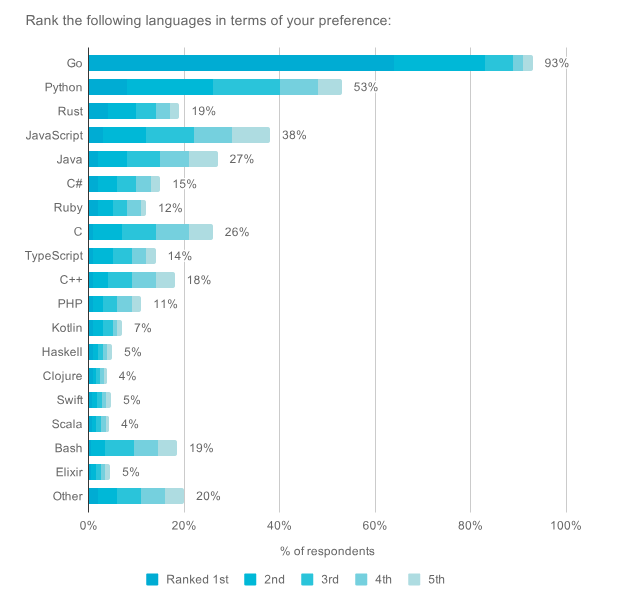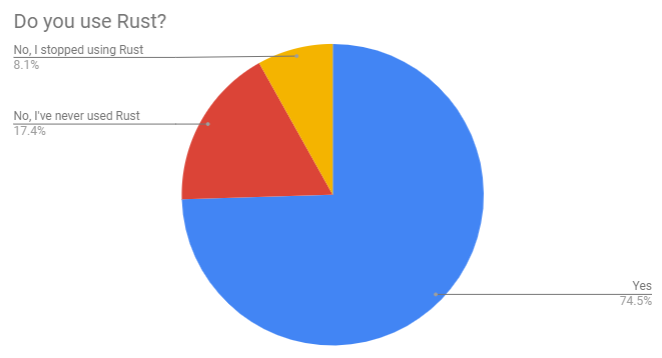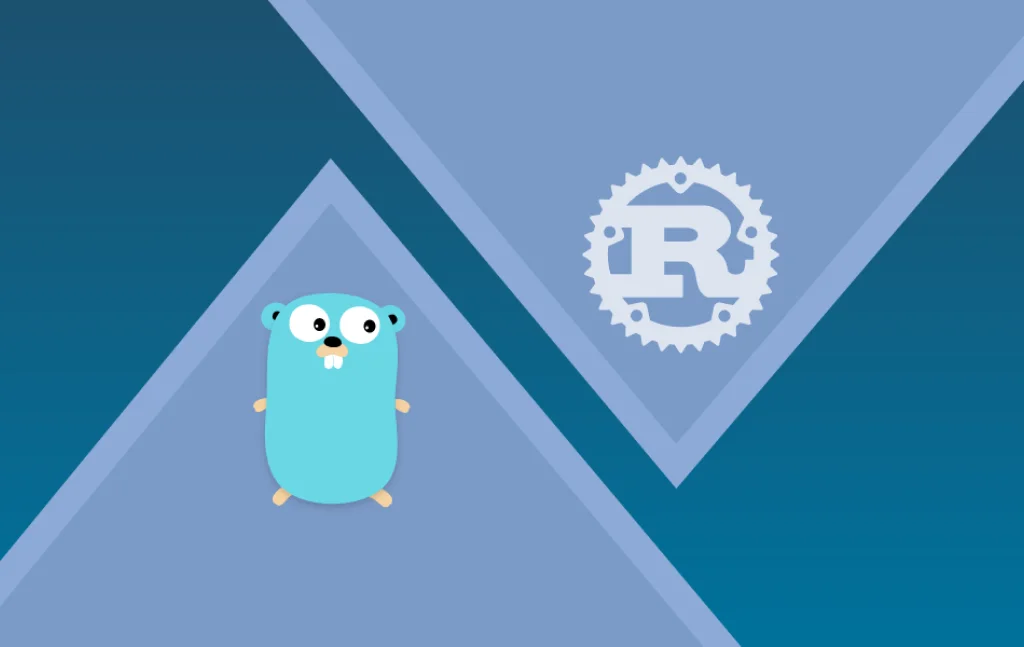Golang vs Rust: Which One to Choose?
- Web
- October 3, 2019
Golang or Rust?
For the millennial developers, dilemmas as these have taken their lives for a spin. Brimming with a number of advantages, both these programming languages have created a stirring ripple the world across.
Over the past few decades, these programming languages have emerged the prime options for enterprise development. Rust was churned out at Mozilla, while on the other hand, Golang was created at Google.
These programming languages provide indispensable features for developing advanced software including, memory safety, integrated tool-chain, open-source development model, strong communities for modern users, and the likes.
Even though Golang and Rust have an array of similarities, they are dramatically different from each other. They were developed for scratching different itches, meeting different requisites, and writing different types of programs.
Drawing a comparison between Golang and Rust is not about figuring out which programming language can perform better. Rather, it’s about determining which language can perform supreme at a given programming task.
Bearing that fact in mind, we must find out the main ways Golang and Rust differ from each other and the kind of responsibilities each is satiable for.
However, in order to understand which programming language is the best fit for your requisites, you should get an in-depth knowledge of Golang as well as Rust.
Look into the following excerpt to demystify numerous unknown facts about them:
An Introduction to Golang
Golang or Go was introduced in the year 2007 by Google. It was conceived as a riposte to a few issues that some organizations were found in building software infrastructure.
Certain problems like computation clusters, web programming models, etc. were handled by workarounds instead of getting fixed directly. Golang was conceptualized and built to bring more productivity midst such environments.
Apart from its well-known aspects like garbage collection, built-in concurrency, the design consideration of Golang also include a rigorous dependency management, robustness across different boundaries between components, and software architectures’ adaptability as advanced systems.
Presently, compared to other server-side programming languages, Golang shares the highest market position in terms of both traffic and popularity.

As per the survey, Web Development is the most preferred domain among Golang users, standing at a whopping 65%. Also, the programming language is majorly used for writing API/RPC services (73%) and developing CLI applications (63%).
Most of all, the promoter score of Golang is positive at 68%, which indicates its popularity is only rising. 90% users in 2018 said they are willing to recommend Golang to others.
In the year 2009, Golang became public finally and began to be used as an open-source project. Some of its influential predecessors are Alef, Hoare’s CSP, Pike’s Newsqueak, etc.
Recently, in February 2019, the 1.12 version of Golang has come up. Some of the biggest highlights of its latest features include an improved modular support, a better iOS and MacOS forwards compatibility, and the likes.
The Major Advantages of Using Golang
- The best asset of Golang has to be its incredible speed. It is a very fast and statically-typed programming language that can compile to machine code. In fact, Golang can work faster than many other programming languages like Python, JavaScript, Java C#, etc.
- The simplicity of code is another perk of using Golang
- Golang is known to be a pragmatic, concise and efficient language
- Golang’s explicit focus is to streamline the process of coding. In the documentation of Golang, it is depicted as an ‘open-source project’ for making programmers more productive
- Its problem-solving approach is mainly emphasized on a programmer’s productivity across different software development cycles
- Flexibility is another biggest strength of Golang
- It is focused on concurrency as a top-tier concept
- It is simple as well as extremely safe to use. It will not tolerate unprotected memory access
- It can excel at writing straight-forward ‘DevOps’ tasks and micro-services
- It has a strong interoperability with C as well as several other programming languages
- One of its rumored objectives was to substitute C++ and C
- Golang is IDE-supported
- Last, but not the least, it is extremely simple to handle
Read also: Decoding Why GoLang Stands Apart from the Other Languages
Disadvantages of Golang
Although Golang has earned a great deal of appreciations from the developers worldwide, it has a number of drawbacks as well. Some of the major pet peeves of Golang are dug out down below:
- It is not a system language
- It sacrifices a few aspects of performance to put an emphasis on its objective of simplicity
- It lets some interoperability via cgo. It is not the anticipated way for Golang programs to be written
- Golang lacks generics to a great extent
- There is not enough immutability in this programming language
- Go is garbage collected that takes a toll on its overall performance
A Brief Overview of Rust
Rust came into being in the year 2010. Often, it is deemed as an advanced extension of the ML languages. Mozilla was the actual underwriter of Rust. The Servo browser engine which is sponsored by Mozilla was developed with the help of Rust.
Some of the major objectives of the Servo project which leverage the ownership and concurrency of Rust include better security, improved parallelism, better performance, and increased modularity.
A market survey by Rust shows 74.5% users who have used the programming language, prefer it, too.

In fact, the number of Rust users was reported to increase in 2018 with nearly a quarter of them using it for at least 2 years. Also, Rust projects are trending in mammoth sizes with large investments.
Also, medium investments exceeding 10K and large investments exceeding 100K lines of code were reported to grow to 23% in 2018 from 8.9% in 2016. This is huge!
However, when surveyed about Rust at work, the programming language showed some not-so-satisfactory statistics. 49.2% companies said they don’t use Rust at work. Those who do are only part-time users at 21.2%. And, those who use it full time stand at only 8.9%.
The 1.0 version of Rust was introduced in 2015 and the 1.33 version of Rust was built in 2019. There is a strong community support for Rust. A few examples of the community projects include Redox, which is an operating system developed in cgmath, Iron, and a linear computer and algebra graphics library.
Some of the Biggest Advantages of Rust
- Rust has an amazing run speed. In some cases, Rust has successfully outperformed Golang.
- Rust is second to none for accomplishing certain tasks in which high performance, safety and concurrency are required.
- Rust is blessed with the complexity of code. It has enabled some fine-grained system controlling features like novel embeddings, rich patterns, rich syntax extensions, and the likes.
- Rust is deemed as the most loved programming language by the millennial developers with a legion of professionals stating they want to keep dealing with it
- This programming language is interoperable with FFI, C, and several other languages
- It has a zero-cost abstraction
- This programming language has an extensive supportive community
- It has a strong support for generics in different forms of trails
- One of the best things about Rust is that it does not tolerate unprotected memory accesses
- It has a very predictable runtime behavior. This means there is neither a garbage collector, nor any cost abstraction
- It has an inviolable safety against all the low-key threats including race condition, Null pointers, and the likes
- It has a near complete control over a hardware which includes processor feature and memory layout
- It saves a lot of time from debugging, crashing, and testing
Disadvantages of Rust
Although, Rust is filled to the brim with legions of advantageous features, it is not completely devoid of pet peeves. It has its own share of setbacks as well, and some of them include the following:
- Rust has a steeper learning curve than Golang
- It is a bit complex programming language. It also requires a serious involvement of ramp-up time for learning and mastering it before most of the people can handle it
- The old habits should be unlearned before the latest concepts are introduced
- Comparatively, Rust is a tad slow to compile
- It can be a tad slower than C++ and C in analogous situations
Golang vs Rust: Which is Better and Why?
Both Rust and Golang can spell benefits galore in designing a web service, which requires dealing with a high volume of traffic. However, as per most of the modern developers, Golang is a lot faster than Rust. It is slightly better than the latter especially if you are working with a large team of developers or have an array of services to write.
Rust has been depicted as an extremely superior programming language by many other developers as well. According to them, it is comparatively more bulletproof than any other programming languages.
However, the worldwide popularity of Golang is a bit higher mainly because of its low ramp-up time and less complexity. Rust can compete for space with C++, etc. in a situation where programmers need to handle complex syntax for ensuring an optimum performance in different fields like AAA game engines, microcontrollers, web rendering
engines, etc.
Since the time immemorial, both these languages have been considered as competitors because they were introduced at the same time. Golang is aimed at maintaining simplicity and letting the developers a better experience of programming.

It also makes a large programming team much more efficient via an application of simplicity. Meanwhile, Rust can empower developers in taking control over a granular level, right from managing how their threads behave with the system of their variables.
As of now, Golang may be ruling the roost, but this picture might change in the near future with Rust topping the developers’ priority lists. Till then, Golang is expected to continually reign supreme.
FAQs About Golang vs Rust
Golang is the perfect choice when you want to write code faster. Go is the best fit when you focus on simplicity and safety is your most priority. Go work great for microservices and for typical “DevOps” tasks.
Rust is second to none for certain projects in which high performance and concurrency are required. You can choose Rust when you need total control over the hardware.
Yes, the best asset of Golang is its incredible speed at which it compiles to machine code. So, Golang is faster than Rust.













